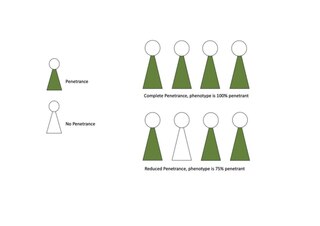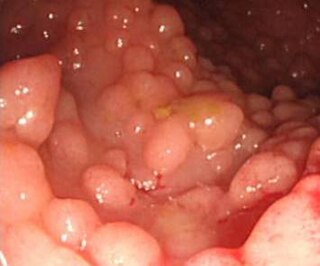
Penetrance in genetics is the proportion of individuals carrying a particular variant of a gene (genotype) that also expresses an associated trait (phenotype). In medical genetics, the penetrance of a disease-causing mutation is the proportion of individuals with the mutation that exhibit clinical symptoms among all individuals with such mutation. For example: If a mutation in the gene responsible for a particular autosomal dominant disorder has 75% penetrance, then 75% of those with the mutation will go on to develop the disease, showing its phenotype, whereas 25% will not.

Breast cancer type 1 susceptibility protein is a protein that in humans is encoded by the BRCA1 gene. Orthologs are common in other vertebrate species, whereas invertebrate genomes may encode a more distantly related gene. BRCA1 is a human tumor suppressor gene and is responsible for repairing DNA.
As with all utility patents in the United States, a biological patent provides the patent holder with the right to exclude others from making, using, selling, or importing the claimed invention or discovery in biology for a limited period of time - for patents filed after 1998, 20 years from the filing date.

BRCA2 and BRCA2 are human genes and their protein products, respectively. The official symbol and the official name are maintained by the HUGO Gene Nomenclature Committee. One alternative symbol, FANCD1, recognizes its association with the FANC protein complex. Orthologs, styled Brca2 and Brca2, are common in other vertebrate species. BRCA2 is a human tumor suppressor gene, found in all humans; its protein, also called by the synonym breast cancer type 2 susceptibility protein, is responsible for repairing DNA.

Mary-Claire King is an American geneticist. She was the first to show that breast cancer can be inherited due to mutations in the gene she called BRCA1. She studies human genetics and is particularly interested in genetic heterogeneity and complex traits. She studies the interaction of genetics and environmental influences and their effects on human conditions such as breast and ovarian cancer, inherited deafness, schizophrenia, HIV, systemic lupus erythematosus and rheumatoid arthritis. She has been the American Cancer Society Professor of the Department of Genome Sciences and of Medical Genetics in the Department of Medicine at the University of Washington since 1995.
Predictive medicine is a field of medicine that entails predicting the probability of disease and instituting preventive measures in order to either prevent the disease altogether or significantly decrease its impact upon the patient.

Fanconi anemia group J protein is a protein that in humans is encoded by the BRCA1-interacting protein 1 (BRIP1) gene.

Partner and localizer of BRCA2, also known as PALB2 or FANCN, is a protein which in humans is encoded by the PALB2 gene.

Tania Simoncelli is Senior Advisor to the Director of the Broad Institute of MIT and Harvard. Prior to that position, she worked for two years as Assistant Director for Forensic Science and Biomedical Innovation within the Office of Science and Technology Policy. From 2010 to 2013, she worked in the Food and Drug Administration's Office of the Commissioner. From 2003 to 2010, Simoncelli worked as the Science Advisor to the American Civil Liberties Union (ACLU), where she advised the organization on emerging developments in science and technology that pose challenges for civil liberties.

A BRCA mutation is a mutation in either of the BRCA1 and BRCA2 genes, which are tumour suppressor genes. Hundreds of different types of mutations in these genes have been identified, some of which have been determined to be harmful, while others have no proven impact. Harmful mutations in these genes may produce a hereditary breast–ovarian cancer syndrome in affected persons. Only 5–10% of breast cancer cases in women are attributed to BRCA1 and BRCA2 mutations, but the impact on women with the gene mutation is more profound. Women with harmful mutations in either BRCA1 or BRCA2 have a risk of breast cancer that is about five times the normal risk, and a risk of ovarian cancer that is about ten to thirty times normal. The risk of breast and ovarian cancer is higher for women with a high-risk BRCA1 mutation than with a BRCA2 mutation. Having a high-risk mutation does not guarantee that the woman will develop any type of cancer, or imply that any cancer that appears was actually caused by the mutation, rather than some other factor.
On 29 March 2010, the US District Court for the Southern District of New York found several of the patent claims on the BRCA1 and BRCA2 breast cancer genes held by Myriad Genetics to be invalid. The patents were initially issued on the basis that the genes were isolated and purified to a non-naturally occurring state, however the court found, amongst other things, that the purification was not markedly different from a product of nature and thus was not patentable. The ruling may have implications for holders of other gene patents and the patentability of other naturally occurring substances. It has the potential to directly affect the operation of the healthcare and medical research industries, particularly with regards to cancer treatment and prevention, and may alter the accessibility of such therapies to patients.

In the Family is a 2008 documentary film, produced by Kartemquin Films, about predicting breast and ovarian cancer and the choices women make when they are faced with the dangers of a possible life-threatening disease. The film's director, Joanna Rudnick, tests positive for the familial BRCA mutation that increases her chances of developing breast cancer by 60%. Faced with these odds, Rudnick must examine her choices of possibly taking her chances or possibly having her breasts and ovaries removed.

A hereditary cancer syndrome is a genetic disorder in which inherited genetic mutations in one or more genes predispose the affected individuals to the development of cancer and may also cause early onset of these cancers. Hereditary cancer syndromes often show not only a high lifetime risk of developing cancer, but also the development of multiple independent primary tumors.
A biological patent is a patent on an invention in the field of biology that by law allows the patent holder to exclude others from making, using, selling, or importing the protected invention for a limited period of time. The scope and reach of biological patents vary among jurisdictions, and may include biological technology and products, genetically modified organisms and genetic material. The applicability of patents to substances and processes wholly or partially natural in origin is a subject of debate.

Molecular diagnostics is a collection of techniques used to analyze biological markers in the genome and proteome, and how their cells express their genes as proteins, applying molecular biology to medical testing. In medicine the technique is used to diagnose and monitor disease, detect risk, and decide which therapies will work best for individual patients, and in agricultural biosecurity similarly to monitor crop- and livestock disease, estimate risk, and decide what quarantine measures must be taken.
Mark Henry Skolnick is an American geneticist and the founder of Myriad Genetics Inc, an American molecular diagnostic company based in Salt Lake City, Utah. His highest cited paper is "Construction of a genetic linkage map in man using restriction fragment length polymorphisms" at 9,898 times, according to Google Scholar.
A variant of uncertainsignificance (VUS) is a genetic variant that has been identified through genetic testing but whose significance to the function or health of an organism is not known. Two related terms are "gene of uncertain significance" (GUS), which refers to a gene that has been identified through genome sequencing but whose connection to a human disease has not been established, and "insignificant mutation", referring to a gene variant that has no impact on the health or function of an organism. The term "variant' is favored in clinical practice over "mutation" because it can be used to describe an allele more precisely. When the variant has no impact on health, it is called a "benign variant". When it is associated with a disease, it is called a "pathogenic variant". A "pharmacogenomic variant" has an effect only when an individual takes a particular drug and therefore is neither benign nor pathogenic.
Association for Molecular Pathology v. Myriad Genetics, Inc., 569 U.S. 576 (2013), was a Supreme Court case, which decided that "a naturally occurring DNA segment is a product of nature and not patent eligible merely because it has been isolated.” However, as a "bizarre conciliatory prize" the Court allowed patenting of complementary DNA, which contains exactly the same protein-coding base pair sequence as the natural DNA, albeit with introns removed.

Jórunn Erla Eyfjörð is an Icelandic molecular biologist and professor emerita at the Faculty of Medicine of the University of Iceland. She is known for her research on breast cancer genetics.

Breast and ovarian cancer does not necessarily imply that both cancers occur at the same time, but rather that getting one cancer would lead to the development of the other within a few years. Women with a history of breast cancer have a higher chance of developing ovarian cancer, vice versa.













